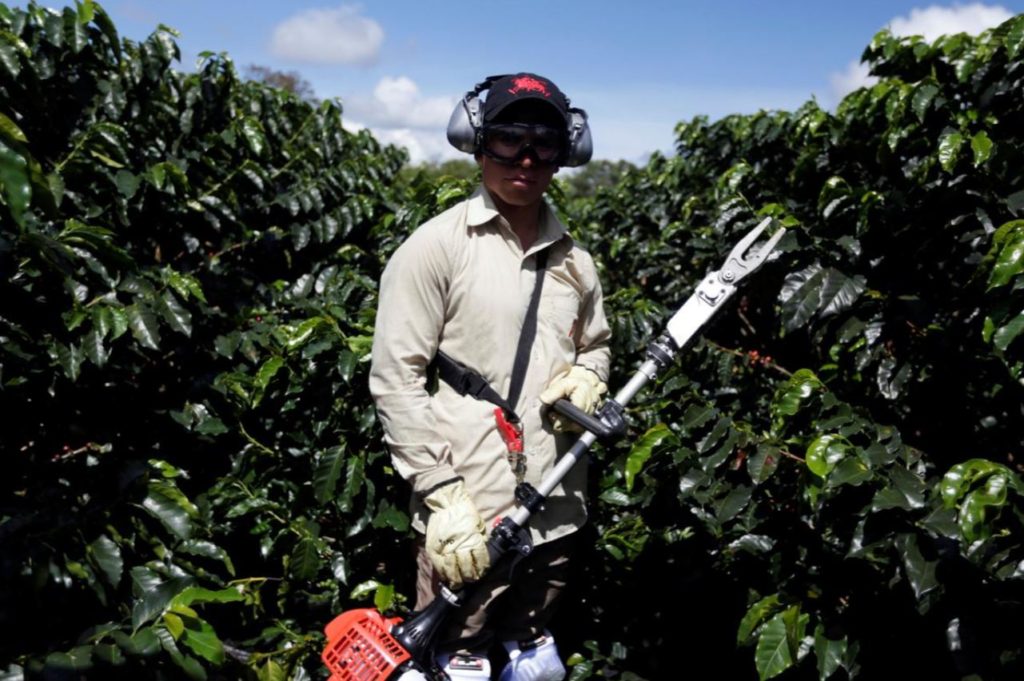“For decades now, Colombia has lead the global coffee industry producing the best quality/price ratio (QPR) coffees and meeting the demand for most specialty washed coffees in the world. Nonetheless, despite their success penetrating different markets, excellent reviews and a permanent raising demand for their coffees, Colombian coffee industry is actually shrinking and losing money.”
How is this possible?
Colombian Coffee is different:
In contrast to Brazilian coffee industry where commercial coffee farmers grow coffee intensively, in large plantations, only 5% of Colombian coffee is produced this way. Most of Colombian coffee comes from smallholder farmer’s households that are not bigger than 2HA in size. This difference represents a huge extra cost in logistics, coordination and training, because instead of dealing with a few large coffee farmers, Colombia deals with thousands of small ones.
To manage this situation, Colombia created the “Federación Nacional de Cafeteros” (FNC); one of the biggest NGO in the world intended to provide training, marketing and financial support to farmers, and “Cenicafé” that is the organization in charge of all the technical and scientific research. These two entities are independent from the government and self-financed by a small fee charged for every pound of exported coffee.
These organizations have extensively contributed with affordable technology, innovative genetic material, sustainability, legislation, business framework, marketing and invaluable scientific data, benefiting not only Colombian coffee farmers but the entire global coffee community as well.
Colombian coffee is expensive to produce:
Since its inception Colombian coffee industry was different, the legislation was developed to prioritized value and quality over volume by adopting Arabica as the only legal coffee crop in the country, over the higher yielded Robusta. Extensive shaded grown coffee farming practices were encouraged over intensive unshaded ones, benefiting coffee quality, the environment and diversity but at the same time restricting farmers from obtaining higher overall yields. Furthermore, hand picking, essential to guarantee the required coffee ripening necessary for specialty coffee production and the only practical harvesting method suitable for an uneven terrain as the one in Colombia, was embraced as the national standard, raising labor share to up to 70% of the total production cost.
SEE ALSO: How can we help smallholder coffee farmers?
Unfortunately, the current international commodity coffee market doesn’t reward, origin, traceability, quality, excellence, sustainability or coffee farmer’s wellbeing; quite the contrary, it is a system basically rooted on speculation, offer and demand, offering coffee producing countries and farmers no other option but to scale production to remain profitable. From all coffee producing countries only Brazil, Vietnam and Indonesia have been successful at it; between the three have been able to duplicate the entire global coffee production in less than 30 years.
Sadly, the coffee global demand hasn’t grown at the same degree, causing international coffee prices to plummet and crash in recent year and along with it, generating a massive recession in coffee producing countries, especially among those where scaling production isn’t an option. This emergency has also forced Brazil, Vietnam and Indonesia to preserve their market share by scaling up production even more, feeding the vicious cycle and perpetuating record low international coffee prices.
What is Colombia doing about it?
The situation has forced Colombia to reconsider its legislation regarding Robusta coffee growing, change and optimize the way human labor is administered during coffee harvesting and more recently it is studying the possibility to step out from the global commodity coffee market.

First mechanized portable coffee harvesting machine, that promises to cut in half current labor costs in Colombia .
First mechanized portable coffee harvesting machine, that promises to cut in half current labor costs in Colombia
What does stepping out of the global commodity market mean?
This option was recently proposed by the FNC general manager Roberto Vélez Vallejo and it is surprising to me. The global commodity market is not optional for coffee producers. Farmers have no leverage or decision-making power here. The coffee commodity market is an instrument exclusively designed to benefit coffee buyers, speculators and traders to help them know up-to-date coffee prices (spot), manage risk (futures) and it’s a key component that infuses liquidity into the coffee industry for it to function.
Historically, it has always been abusive and insensitive towards producers, its origin dates back to ancient times when Europeans used to suck their colonies dry by abusing slaves, natives and peasants. Although we like to think those times are over, we still preserve the system the Dutch conceived back then in 1602. A market that besides cruel and unfair towards farmers, keeps fueling unsustainable farming practices vastly negative for the environment. And this is undoubtedly not a place for a coffee producing country that is committed to thrive through excellence.
If Colombia is serious about stepping out from it, it would need to develop a similar system that offers at least the same level of benefits and convenience for buyers and traders the current one has. It would be unprecedented and it would require a massive effort, if successful, it would stand as a milestone in history indicating the start of a complete new global coffee order, a coffee industry free and independent from the shackles of a market that doesn’t represent it, where coffee could be priced considering local reality, production cost fluctuations and nation’s economic strategy.
SEE ALSO: Is Fair Trade good for coffee farmers?
It’s pleasant to fantasize about it, visualizing all the possibilities and benefits coffee farmers would enjoy if a project like this becomes ever a reality, but regardless the outcome for Colombia, I am optimistic about the future and believe that we, the new generation of coffee consumers, do have changed; we have a new understanding of coffee and we now value the environment and the work farmers do, so while the task ahead for Colombia is humongous, uncertain and risky, it is definitely a cause worth embracing and support by all of us.
Hopefully, ethical and responsible coffee buyers and traders would join this battle, keeping their support, and Colombia will raise triumphant, paving the road of innovation (as always) for other nations to follow.
